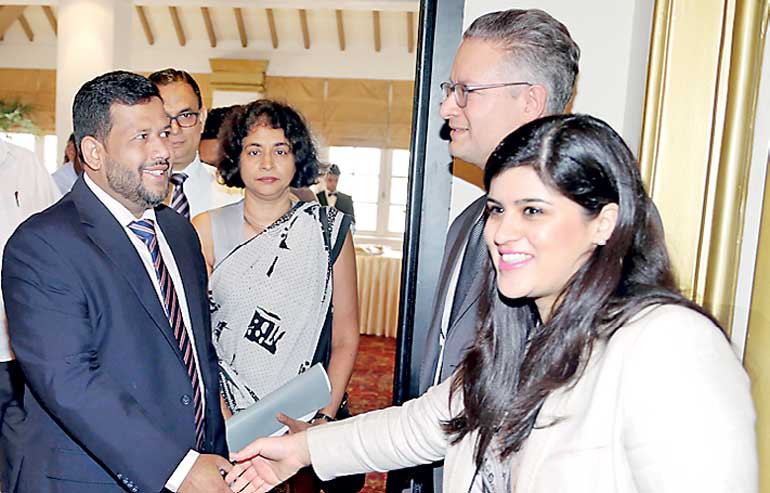Monday Feb 23, 2026
Monday Feb 23, 2026
Tuesday, 21 February 2017 00:10 - - {{hitsCtrl.values.hits}}

Recording a pioneering initiative in Sri Lanka’s exports history, the country is moving to set up the first-ever national level mechanism to overcome a daunting modern global trade issue it faces – sanitary and phytosanitary compliance (essentially export quarantining and other technical barriers).
“The Department of Commerce is ready to set up a ‘National Committee on SPS and TBT’ to overcome our export compliance issues, especially Sanitary and Phytosanitary and Technical Barriers to Trade.
I thank the WTO for their valuable and ongoing support to Sri Lanka,” said Minister of Industry and Commerce Rishad Bathiudeen addressing the press yesterday at the Taj Samudra.
The press conference was held following the inauguration of the pioneering Colombo info session by the Department of Commerce with WTO experts for Lankan exporters, compliance officials and specialists on Sanitary and Phytosanitary and Technical Barriers to Trade (SPS and TBT).
WTO Economic Affairs Officer Roshan Khan and WTO Trade and Environment Counsellor Erik Wijkstrom (who are attending the three-day session that concludes on 22 February) will brief the DoC further on setting up the new mechanism and SPS and TBT way forward.
“I am pleased that this SPS info series launched by the Ministry with two WTO experts in September 2014 has today grown to include a bigger number of experts and SPS subject officials in Sri Lanka. On behalf of Sri Lanka’s trade sector I thank the WTO for their valuable and ongoing support to us,” said Bathiudeen.
He added: “As I stressed in 2014, more and more countries around the world continue to reduce their border tariffs especially through an increasing number Regional Trade Agreements (RTAs). Since 1995 over 400 additional arrangements have been notified to WTO. In this background SPS and TBT measures have begun to create a significant impact on international trade impacting Sri Lanka negatively as it is a small and vulnerable economy. These SPS and TBT measures appear to be highly complex and increasingly challenging for our exporters. This DoC session will provide important information on understanding the implementation of WTO agreements on SPS and TBT and using these instruments to the best advantage of our exports and imports of goods.”
Noting that the Government had embarked on a new journey of accelerated economic development activities, he said it was looking for new FTAs and that currently FTAs were being negotiated with China and Singapore and the present FTA with India too could be expanded for which talks are ongoing.
“Accordingly, it is absolutely necessary for SPS and TBT measures to ensure the quality of Sri Lankan exports without restricting our trade and avoiding unnecessary disruptions. The EU-Sri Lanka Trade Related Assistance project coordinated by the Department of Commerce has identified quality infrastructure as a priority area to strengthen the national quality infrastructure.”
According to the DoC, the newly-planned SPS and TBT Committee under the Department of Commerce is a high-level cross-functional mechanism with 14 institutions (ministries and specialised Government institutions including the Agriculture Ministry, Customs, Quarantine Department, the Import Export Department, etc.) getting involved. Once primary official set up processes are cleared, the Committee is scheduled to start its work by or before mid-2017.
WTO Trade and Environment Counsellor Erik Wijkstrom stressed that SPS and TBT compliance has become a great need in exports of developing countries such as Sri Lanka. “Across the world, average trade tariff is at 9%. Tariff reduction is not so important anymore. What is now important for trade is overcoming non-tariff barriers such as quality compliance, SPS and TBT. Compliance in these are especially beneficial for agricultural exports of countries such as Sri Lanka.”
Around 22% of Sri Lanka’s annual exports are agricultural, at $ 2.5 b.